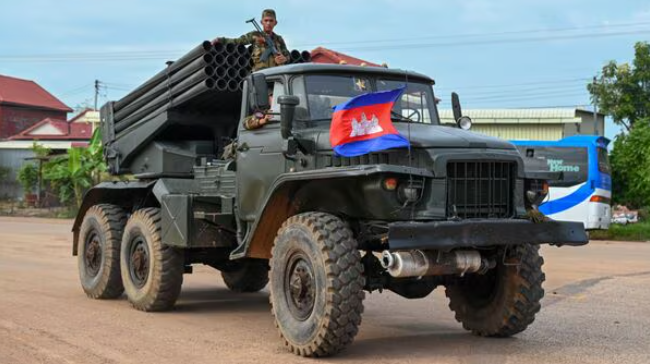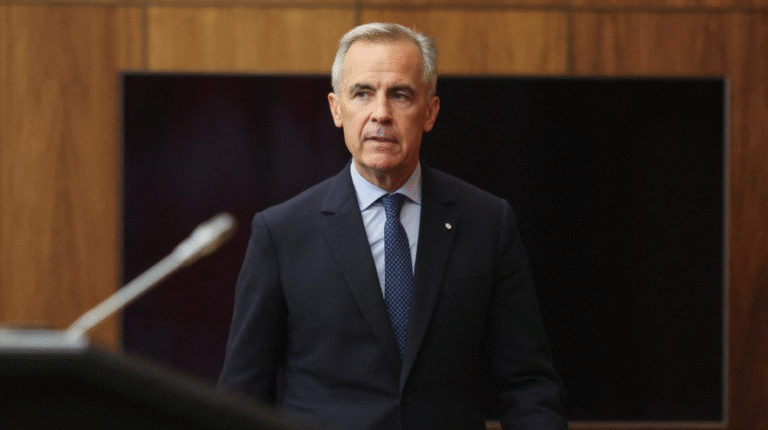
As deadly clashes between Cambodia and Thailand stretch into a second day, Phnom Penh has issued a call for an “immediate and unconditional ceasefire”, even as Bangkok remains cautious but open to dialogue. The flare-up, triggered by a land mine explosion that injured Thai troops, has evolved into one of the region’s most serious border conflicts in years, forcing mass evacuations and raising fears of broader conflict.
What’s Happening at the Thailand-Cambodia Border?
1. Artillery Battles Escalate
The Thai-Cambodian border has witnessed intense artillery exchanges since Thursday, spreading across multiple locations. Heavy weapons, including BM-21 rocket launchers, have reportedly been deployed by Cambodian forces, while Thailand responded with what it described as “appropriate supporting fire.”
2. Death Toll and Evacuations
As of Friday, Cambodia confirmed 13 fatalities, while Thailand has reported 19 deaths, the majority being civilians. According to Thailand’s Health Ministry, over 138,000 civilians have been evacuated from its border provinces. In addition, 46 people have been injured, including 15 Thai soldiers.
Cambodia Urges UN, ASEAN for Help
Cambodia’s envoy to the United Nations, Chhea Keo, appealed for urgent international intervention during a closed-door UN Security Council session. He emphasized that Cambodia seeks a peaceful, diplomatic resolution and questioned accusations that his country initiated the attack. “We are a small country with no air force. How could we launch an offensive against an army three times our size?” Keo argued.
Keo also confirmed that Cambodia is open to mediation via Malaysia, which currently chairs the Association of Southeast Asian Nations (ASEAN).
Thailand Responds: Open to Talks, But No Proposal Yet
Thai Foreign Ministry spokesman Nikorndej Balankura acknowledged that Bangkok is open to bilateral or multilateral talks—possibly involving Malaysia—but stated that no formal proposal has been received. Fighting reportedly began to subside slightly by Friday afternoon.
Acting Thai Prime Minister Phumtham Wechayachai, meanwhile, warned of the potential for full-scale war if the violence continues unchecked. “For now, it remains limited to clashes,” he said, though he confirmed Cambodia had used BM-21 rocket systems in the attacks.
Malaysia Steps In: ASEAN’s Diplomatic Push
Malaysian Prime Minister Anwar Ibrahim has offered to mediate the conflict and claimed both nations agreed in principle to a ceasefire and troop withdrawal, though neither side has confirmed a timeline. He also urged leaders from both countries to pursue peaceful dialogue and de-escalation.
Temples, Territory, and Tension: Root Causes
The latest flare-up stems from a long-standing border dispute, particularly near areas with ancient temples. The crisis was triggered by a land mine explosion on Wednesday, injuring five Thai soldiers, which quickly escalated into coordinated assaults across six key areas.
Thailand has accused Cambodia of targeting civilian infrastructure, including a hospital and petrol station. Both sides continue to blame each other for initiating hostilities.
What happened So Far:
- 13 Cambodian soldiers and 19 Thai civilians/soldiers confirmed dead
- Clashes centered around disputed temples and multiple border points
- BM-21 rocket launchers used by Cambodian forces
- Thailand evacuates over 138,000 civilians
- UN and Malaysia pushing for diplomatic resolution
- No formal ceasefire in place yet despite mutual signals of readiness
Why This Matters
The rapidly escalating Thailand-Cambodia conflict poses serious regional stability risks and threatens the lives of thousands living along the 800-km shared border. As both nations are members of ASEAN, this crisis is seen as a test of the bloc’s ability to mediate intra-regional disputes. With ancient heritage sites, major tourist routes, and border infrastructure at stake, the international community is closely monitoring the situation.
Looking Ahead
While both countries have publicly expressed willingness to seek diplomatic solutions, the lack of a concrete ceasefire agreement and ongoing cross-border artillery exchanges make the situation fragile. The next 48 hours will likely be crucial in determining whether ASEAN-led diplomacy can prevent a broader conflict.





